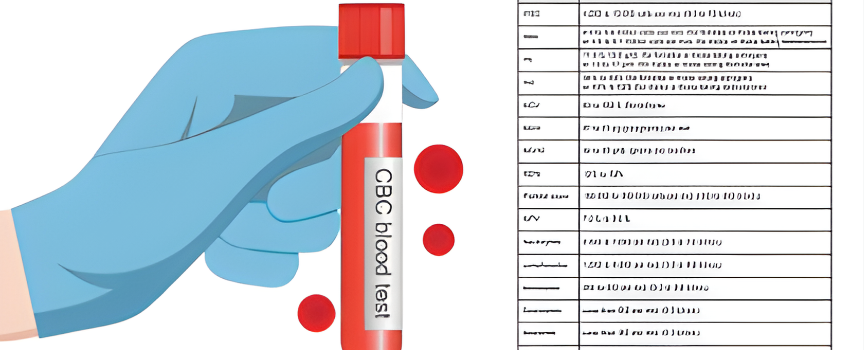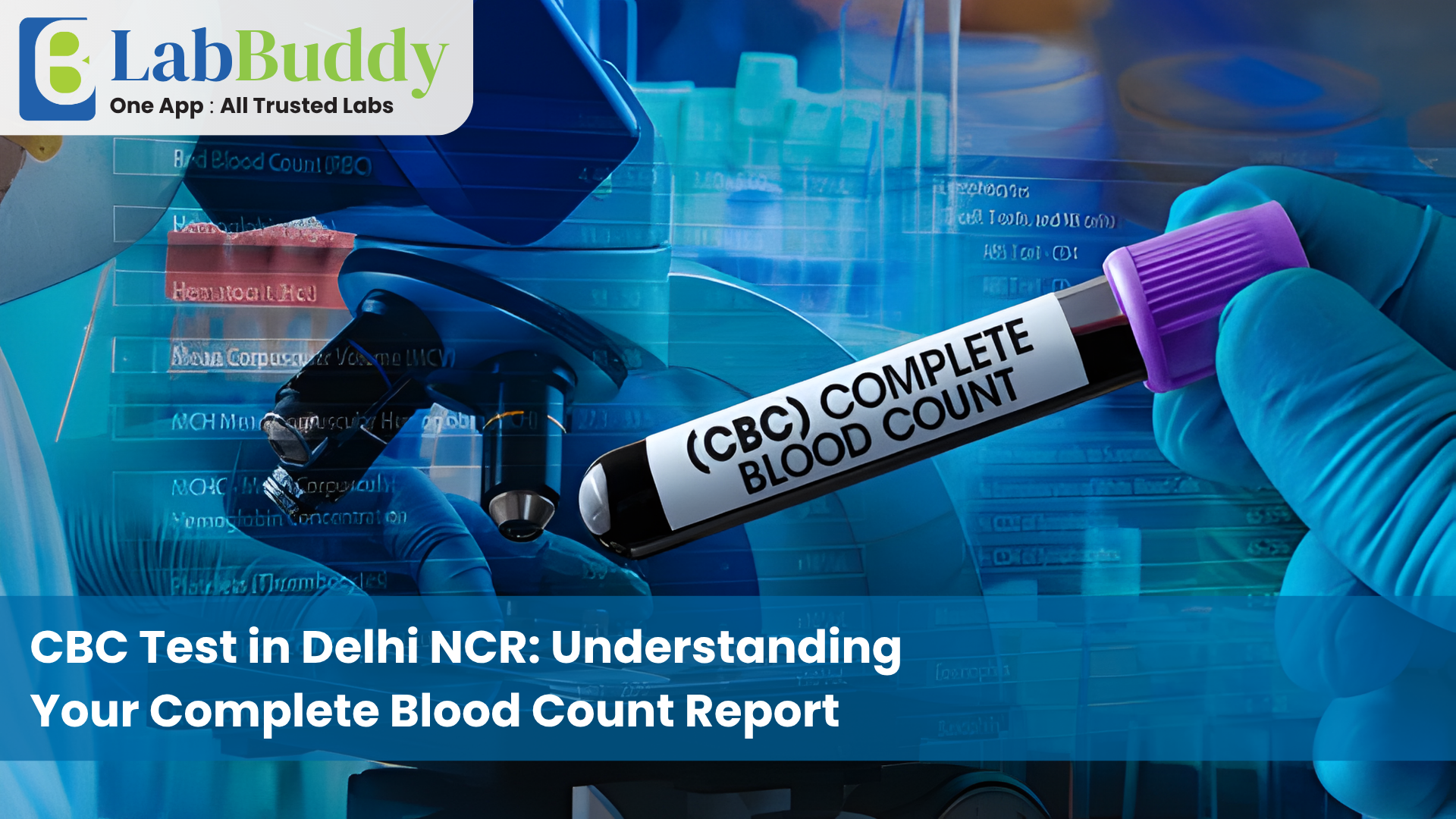CBC Test in Delhi NCR: Understanding Your Complete Blood Count Report
What is a Complete Blood Count (CBC)?

A Complete Blood Count (CBC) is one of the most comprehensive and frequently ordered blood tests that provides a detailed snapshot of your overall health status. This test examines different components of your blood and can help detect various conditions including infections, anemia, and blood disorders.
Why CBC is Critical in Delhi NCR:
Helps assess health impacts of urban lifestyle
Detects early signs of pollution-related health issues
Provides baseline health information
Essential for preventive healthcare
Components of CBC Test
Red Blood Cell Count (RBC)
Red blood cells carry oxygen from your lungs to the rest of your body. The RBC count measures the number of red blood cells in your blood sample and helps assess your body's oxygen-carrying capacity.
Normal Range:
Men: 4.5-5.9 million cells/mcL
Women: 4.1-5.1 million cells/mcL
What Low RBC Might Indicate:
Anemia
Nutritional deficiencies
Chronic diseases
Blood loss
Bone marrow problems
What High RBC Might Indicate:
Lung diseases
Congenital heart defects
Dehydration
Living at high altitudes
Hemoglobin (Hb)
Hemoglobin is the protein in red blood cells responsible for carrying oxygen. It's a critical indicator of your blood's oxygen-carrying capacity and overall health.
Normal Range:
Men: 13.5-17.5 grams/dL
Women: 12.0-15.5 grams/dL
Importance in Delhi NCR Context:
Helps assess impact of air pollution on oxygen absorption
Indicates nutritional status
Reveals potential respiratory health issues
Hematocrit (Hct)
Hematocrit measures the percentage of your blood volume composed of red blood cells. It provides insights into your blood's composition and potential health conditions.
Normal Range:
Men: 38.3-48.6%
Women: 35.5-44.9%
White Blood Cell Count (WBC)
White blood cells are crucial components of your immune system, fighting infections and protecting your body against diseases.
Normal Range: 4,500-11,000 white blood cells/mcL
Types of White Blood Cells:
Neutrophils: Fight bacterial infections
Lymphocytes: Combat viral infections
Monocytes: Help fight chronic infections
Eosinophils: Respond to allergic reactions
Basophils: Involved in inflammatory responses
What Abnormal WBC Might Indicate:
Infections
Inflammation
Immune system disorders
Certain cancers
Medication effects
Platelet Count
Platelets are essential for blood clotting, helping prevent excessive bleeding when you're injured.
Normal Range: 150,000-450,000 platelets/mcL
What Abnormal Platelet Count Might Indicate:
Bleeding disorders
Bone marrow problems
Autoimmune conditions
Medication side effects
Why CBC Test is Important

Comprehensive Health Screening
CBC is often used as a general health screening tool to check for various disorders and conditions before symptoms appear.
Diagnosis Support
Healthcare providers use CBC results along with symptoms and physical examination findings to help diagnose medical conditions.
Treatment Monitoring
For patients undergoing treatment, CBC helps monitor the effectiveness of therapy and detect any side effects.
Understanding Your CBC Results
Reference Ranges
CBC results include reference ranges that represent normal values for healthy individuals. These ranges may vary slightly between laboratories and can differ based on age, gender, and other factors.
Interpreting Abnormal Results
Results outside the normal range don't necessarily indicate a serious problem. Various factors including medications, recent illness, diet, and lifestyle can affect CBC values.
Common Conditions Detected by CBC
Anemia
Low red blood cell count or hemoglobin levels may indicate different types of anemia, which can be caused by:
Iron deficiency
Vitamin B12 deficiency
Chronic diseases
Blood loss
Bone marrow problems
Infections
Elevated white blood cell counts often indicate the presence of:
Bacterial infections
Viral infections
Inflammatory conditions
Immune system responses
Blood Disorders
CBC can help detect various blood disorders including:

Leukemia
Lymphoma
Sickle cell disease
Thalassemia
Myelodysplastic syndromes
Preparing for CBC Test
No Special Preparation Required
Unlike many other blood tests, CBC typically doesn't require fasting or special preparation. You can eat and drink normally before the test.
Medication Considerations
Inform your healthcare provider about all medications you're taking, as some drugs can affect blood cell counts.
CBC Test Procedure
Sample Collection
Location: Can be done at lab, hospital, or through home collection
Process: Simple blood draw from vein in your arm
Duration: Typically takes 5-10 minutes
Discomfort: Minimal, just a quick needle prick
Processing
Advanced Automated Analyzers: Precise cell counting and analysis
Multiple Parameter Measurement: Simultaneous assessment of different blood components
Quality Control: Rigorous verification of results
When to Get CBC Test
Routine Health Checkups
Annual physical examinations
Preventive health screenings
As part of comprehensive health packages
Specific Health Concerns
Persistent fatigue
Unexplained weight loss
Frequent infections
Bruising or bleeding issues
Before surgical procedures
Chronic Condition Management
Monitoring ongoing treatments
Tracking medication effects
Managing conditions like diabetes, kidney disease
Special Considerations for Delhi NCR Residents
Urban Health Impact
CBC can reveal health effects specific to Delhi NCR's environment:
Air pollution exposure markers
Respiratory system stress indicators
Immune system response to environmental challenges
Lifestyle Factors
CBC helps assess health impacts of:
Sedentary work environments
High-stress professional settings
Irregular eating habits
Limited physical activity
Cost and Accessibility
Pricing in Delhi NCR
Average Cost: ₹300-₹800
Factors Affecting Price:
Lab location
Technology used
Additional analysis requirements
Insurance Coverage
Many health insurance plans cover CBC as part of preventive health checkups
Corporate health packages often include CBC
Technology and CBC Testing
Advanced Diagnostic Tools
Digital Reporting: Instant electronic reports
Cloud-Based Storage: Easy access and tracking
AI-Powered Analysis: Advanced interpretation algorithms
Mobile App Integration: Quick result access
Conclusion
A Complete Blood Count is more than just a test – it's a comprehensive health assessment that provides crucial insights into your body's functioning. For residents of Delhi NCR, where urban lifestyle and environmental factors significantly impact health, regular CBC tests are an essential tool for preventive healthcare.
By understanding your CBC report, you take a proactive step towards maintaining your health, detecting potential issues early, and making informed decisions about your well-being.
Remember, while this guide provides comprehensive information, always consult with healthcare professionals for personalized medical advice and interpretation of your specific test results.



